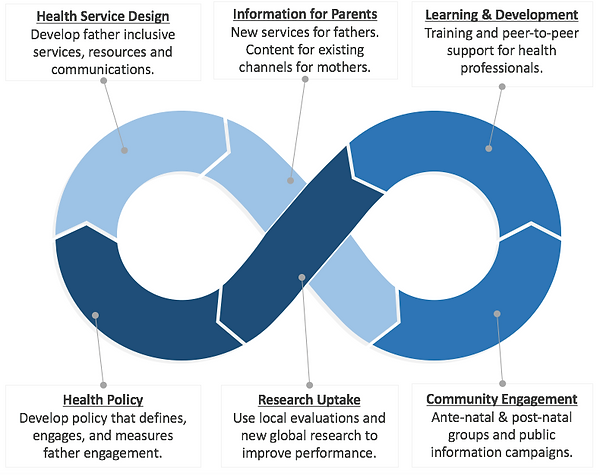The Family Initiative has been tracking and reporting on research on fathers in neonatal care since 2015 on FamilyIncluded.com. It became apparent that some interesting and new ideas were emerging in newly published articles. In response to this, the Family Initiative approached all the authors and proposed a joint effort to report on all the new evidence.
We have since published an article in the Journal of Neonatal Nursing - Fathers in neonatal units: Improving infant health by supporting the baby-father bond and mother-father co-parenting.
This discusses the findings from 50 pieces of research in recent years on fathers in neonatal units.
The principle finding is that understanding and supporting father-infant attachment and supporting co-parenting improves the health of the baby and helps both parents to care for the baby and for each other.
RESEARCH REVIEW
FATHERHOOD PROGRAMME
In 2016 the World Health Organisation declared that engaging fathers is a global priority: “Men have an important role in safeguarding family health, and they should receive support to do so.”
We have developed a flexible approach to improve maternal and newborn health
outcomes through the focused engagement of fathers.
OVERVIEW

Evidenced Health Outcomes
-
Reduction in maternal mortality
-
Reduction in mental health conditions for women and children
-
Improved access by mothers to health services
-
Reduction in gender based violence
-
Increased breastfeeding rates
Influencing Factors
-
Conflict and People on the Move
-
Faith and Religion
-
Family Economic Status
-
Male Role Models
-
Cultural Expectations
Our Principles and Beliefs
-
Outcomes for children are determined and enhanced by the quality of the “community of care” around them. When fathers care, the whole family system benefits.
-
We are guided by evidence from research and evaluations on methods of father engagement.
-
Biology and neurobiology have confirmed that men have strong innate caring capacities that are triggered by actively caring for a baby.
-
Fathers want clear information and to be treated as a man, parent, partner and family member.
-
Maternal and new born health services hold the keys to overcoming gender barriers. Proactive support for fatherhood by services overcomes cultural challenges.
-
We believe that mothers have a right to health services providing accurate and helpful information and support directly to fathers, rather than being made responsible themselves for informing their families.
INFORMATION SERVICES
Expecting fathers want to be well informed, so that they can do their best for mother and baby.
We provide maternal health services with content for fathers including information and digital tools around pregnancy, birth, breastfeeding, postnatal depression, miscarriage, stress, bonding and healthy eating.
Our content is based on published evidence and tailored for use within existing information channels for families.

HEALTH SERVICE DESIGN
We work with health professionals to configure services to be engaging for fathers during pregnancy, the birth and early childhood.
We can help you with:
-
Understanding health benefits of engaging fathers
-
Considering cultural barriers (for both service and parents)
-
Delivering consultation programs with potential service users
-
Design of father and family friendly settings
-
Referral and recruitment pathways
-
Service delivery programmatic design and health outcome goals
-
Setup of monitoring and evaluation processes

COMMUNITY ENGAGEMENT
We design and deliver antenatal and postnatal groups for fathers and/or couples.
Sessions cover a range of topics including practical guidance on questions that fathers-to-be are asking, including expectations, relationships, co-parenting and the father's role during pregnancy, labor and in the first few months.
Alongside group sessions, we deliver public information campaigns to raise awareness of the difference fathers make for children, mothers and families during pregnancy, birth and early childhood.
Raising community awareness supports and enforces supportive social culture and the modern aspirations of expecting fathers.

LEARNING & DEVELOPMENT
We can work with you to design and deliver training and learning resources for health professionals, tailored to your context.
We have also developed an online CPD course, exploring how engaging fathers in maternal and newborn health can improve health outcomes for the mothers, babies and fathers. Our course is split into 3x 1.5 hour interactive webinar sessions delivered by our experience trainers and midwifes:
1) Introduction, Policy Context and Women’s Rights
2) Father's Motivations, Biology of Fatherhood, Health Outcomes and Evidence
3) Barriers and Practice

RESEARCH UPTAKE
We monitor and report on all new research on “family inclusive” maternal and newborn healthcare on our website www.familyincluded.com
We combine this international knowledge with local outcomes studies and evaluations to build bodies of research relevant to stakeholders working in a particular location, field of healthcare or community group.
Our research uptake activities include:
-
Identifying impact objectives, means of verification, assumptions and risks
-
Targeted stakeholder analysis
-
Creation of key messages against stakeholder personas
-
Dissemination through policy briefings, training and interactive sessions
-
The creation of resources such as self-audit tools and strategy templates
-
Monitoring and evaluation of impact, outputs and outcomes

POLICY
Within health policy, the father-child relationship is not as strongly valued and supported in the way that the mother-child relationship is. Children, mothers and the wider family bears the cost of this, particularly in vulnerable and low-income families.
We work with policy makers in:
-
Development of health policy: working with innovators in the sector, identify good practice that can be mainstreamed via policy change. Identify and compile data necessary for making policy and making the case for change.
-
Promoting change: active engagement with key influencers to make the case for change, mobilizing support for policy change including collaboration with Government.
-
Health sector uptake: develop improved performance in delivery through associated guidelines, training and professional peer support.

